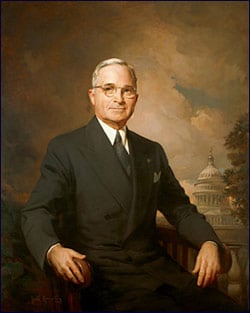Harry Truman born on May 8, 1884 was the thirty-third President of the United States from1945-1953 and as Vice President ascended the office upon the death of Franklin D. Roosevelt.
In home affairs, Truman faced too many challenges related to the economy marked by severe shortages and many strikes. the Taft-Hartley Act over his veto was the greatest challenge among all. After overcoming all predictions to be the winner of 1948 he was still unable to pass his Fair Deal program. He used official executive orders to begin the integration of the U.S. armed forces. He also introduced orders to launch a system of loyalty reviews to abolish thousands of Communist members from government office.
He strongly disapproved compulsory loyalty oaths for governmental employees. This led to accusations that his administration was biased towards Communism. Truman’s presidential rule also was eventful in the section of foreign affairs. the events started with victory over Germany and then the atomic bombings of Hiroshima and Nagasaki, following with the surrender of Japan and the end of World War II.
The establishment of the United Nations, the Marshall Plan to reconstruct Europe, the Truman Doctrine to preach Communism, the start of the Cold War, the founding of NATO, and the Korean War all took place under Harry Truman’s era.
Truman‘s administration contained impurities that reached the cabinet and senior authorities. In spite of this Truman’s name appeared on the election nominees list a second time in 1952, in the New Hampshire Primary. Truman did not campaign and thus lost to his rival Senator Estes Kefauver. After retiring, Truman wrote his past Memoirs of presidential era.
Harry Truman was an informal, unassuming president. His popular phrases were “the buck stops here” and “If you can’t stand the heat, you better get out of the kitchen. “At one point his public view evaluations were the lowest on record; surprisingly today the US scholars rank him among the top ten Presidents of US. Harry Truman’s death on December 26, 1972 was quite mournful for the US citizens.
Facts |
|
|---|---|
| Full Name: | Harry S. Truman |
| Date of Birth: | May 8, 1884, Lamar, Missouri |
| Died on: | December 26, 1972, Kansas City, Missouri |
| Burial site: | Courtyard of the Truman Presidential Library, Independence, Missouri |
| Parents: | John Anderson and Martha Ellen Young Truman |
| Spouse: | Elizabeth “Bess” Virginia Wallace (1885-1982; m. 1919) |
| Children: | Mary Margaret (1924-2008) |
| Religion: | Baptist |
| Education: | Attended Kansas City School of Law |
| Profession(s): | Clerk; salesman, farmer; soldier |
| Government ranks: | Jackson County, Missouri, judge; U.S. Senator from Missouri |
| Political party: | Democratic |
| President Term: | April 12, 1945-January 20, 1949 (first term); January 20, 1949-January20, 1953 (second term) |
| Age when assumed office: | 60 |
Outcome of the Elections |
|||
|---|---|---|---|
| 1948 | Presidential / Vice Presidential Candidates | Popular votes | Electoral votes |
| Harry S. Truman / Alben W. Barkley (Democratic) | 24105695 | 303 | |
| Thomas E. Dewey / Earl Warren (Republican) | 21969170 | 189 | |
| J. Strom Thurmond / Fielding L. Wright (States’ Rights Democratic) | 1169021 | 39 | |
Snapshot of Harry Truman’s life |
|
|---|---|
| 1884 | Born in Missouri |
| 1906-16 | Works on family farm in Grandview, Missouri |
| 1918 | Leads army units with distinction in France and Italy during World War I |
| 1919-22 | Works at a men’s clothing store in Independence, Missouri |
| 1923-33 | Serves as judge in Jackson County Court, Missouri |
| 1934-45 | Serves as U.S. Senator from Missouri |
| 1939-45 | World War II |
| 1945 | Serves as vice president under Franklin D. Roosevelt; assumes the office of president after Roosevelt dies; World War II ends |
| 1945-53 | Serves as thirty-third U.S. President |
| 1950-54 | Korean War |
| 1953 | Retires to Independence, Missouri |
| 1972 | Dies in Missouri |
Presidential Term and its details |
|
|---|---|
| Dates: | April 12, 1945-January 20, 1949 (first term) |
| January 20, 1949-January 20, 1953 (second term) | |
| Vice President: | None (1945-49) |
| Alben W. Barkely (1949-53) | |

